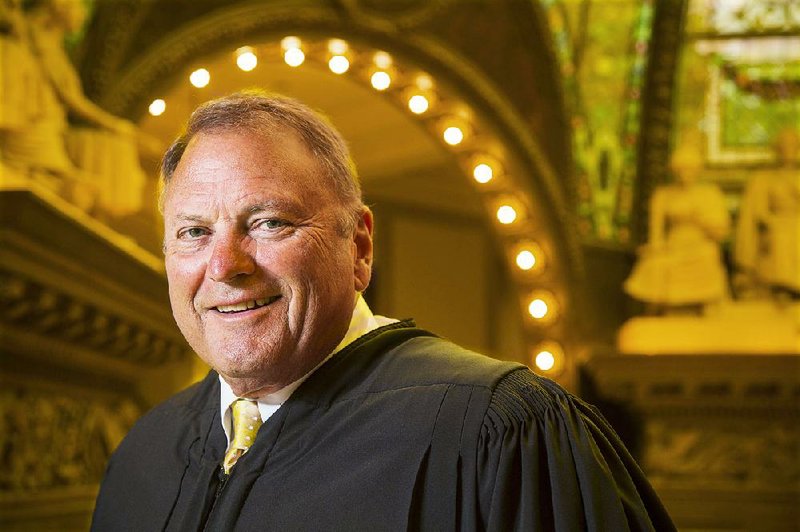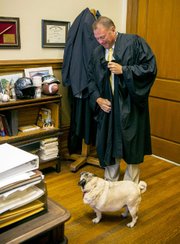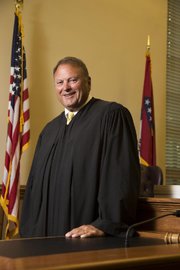He has presided over grisly murder cases, prosecuted a good friend and has been called a rogue judge by his critics.
But here's one thing you might not know about Pulaski County Circuit Judge Chris Piazza: He loves to read and write poetry.
The judge, who threw out the state's ban on same-sex marriage, has a tear in his eye as he talks about a poem by the late poet Miller Williams of Fayetteville.
"It is about baseball and this dad trying to teach his son how to throw, and he eventually says, 'I threw a ball to you ...'" he says, stopping in midsentence.
The poem is Catch With Reuben. It reads:
You took for gospel what I said,
holding the glove
in just the way I said you should.
Knowing I never could teach you enough,
I thought that when you understood
how carelessly moments disappear,
your mind might hold, from a distant year,
a fading day and us still here.
No matter that your legs are short,
your arms are small,
it will all be right in time.
This arm that never threw a ball
far enough to make a team
if more than nine came out to play
threw one into your hands today
from nearly sixty years away.
As the father of three sons, Piazza has spent many hours tossing a baseball. And he has spent many hours writing poetry he plans to leave to his wife, Melody, after his death. But he is not willing to share.
"Oh no. I can't do that. It's too personal," he says.
His other writings are public record, a part of thousands of lawsuits he has been involved in during his years as a prosecutor and then a judge. One of the most noteworthy is a paragraph in his opinion in M. Kendall Wright v. State of Arkansas, the gay marriage case.
"It has been over forty years since Mildred Loving was given the right to marry the person of her choice," he wrote about the landmark 1967 interracial marriage case. "The hatred and fears have long since vanished and she and her husband lived full lives together; so it will be for the same-sex couples. It is time to let that beacon of freedom shine brighter on all our brothers and sisters. We will be stronger for it."
"I was really proud of the opinion when it went out," he says while sitting at a table in his courtroom. "I thought it was solid, and I had a good feeling the United States Supreme Court would affirm it. And the truth of the matter is it may upset someone's view of religion, but it has nothing to do with a religious view."
In researching the opinion, Piazza turned to the 1857 Dred Scott case -- an enslaved black man who unsuccessfully sued for his and his family's freedom. Scott claimed they should be granted their freedom because they had lived for four years in Illinois and the Wisconsin Territory where slavery was illegal.
"He tries to go to the United States court to get help and they claim since his ancestors came over on a slave ship, he wasn't a citizen for the purpose of going to court," Piazza says.
"I thought how would you like to be the judge who penned that opinion," he says of Chief Justice Roger B. Taney. "I mean for the rest of your existence in legal literature, you are going to be the judge that wrote that."
"But then I found a dissenting opinion and there was one paragraph in there that knocked me to my knees that said that slaves are not mere chattel. He bears the impress of his maker, and is amenable to the laws of God and man; and he is destined to an endless existence,"' he said of Justice John McLean's dissent.
On May 9, 2014, Piazza ruled the state's ban on gay marriage was unconstitutional. The National Organization for Marriage called him a rogue judge. Former Gov. Mike Huckabee called for his impeachment. An appeal was filed to the Arkansas Supreme Court.
The state Supreme Court never ruled on the appeal of Piazza's ruling. The appeal died when the U.S. Supreme Court ruled June 26 that bans on same-sex marriages were unconstitutional. That same day, Piazza officiated over the marriage of Tony Chiaro and Earnie Matheson, a gay couple who had been together for 26 years.
"A lot of people say this is a right that belongs to the churches to establish a marriage between a man and a woman. That's absolutely not true because the people who drafted our Constitution were so intent on separating church and state," Piazza says. "They had come from places where they had been persecuted for religious beliefs and so those are kept apart from governmental control and that's why when we go down to the clerk's office to get a marriage license it doesn't ask whether you are Catholic or Protestant or Muslim. It's a document by the government that allows you certain benefits and certain rights."
Melody Piazza, a lawyer in private practice, says she believes the gay-marriage case will be her husband's legacy. She said he spent months writing and rewriting the opinion.
"I think his legacy as a prosecutor, and later as a judge, is he has always been willing to do what he believes is the right thing even though it is sometimes the hard thing to do and the least popular," she says. "I think that has been true as long as I have known him."
For his own wedding, Piazza asked now-retired Circuit Court Judge John Plegge to handle it.
"I performed his wedding for he and Melody and he wrote the vows and they were some of the most beautiful I've ever read," Plegge says.
The vows end with "This ring is a sign of love's golden emotion. Let it forever bind a lifetime of devotion."
Melody Piazza says her husband is a very sensitive person. When they were dating, he would write her poems.
"He is just one of those people who feels everything right now and you can see it all over his face."
SECOND FLOOR
Piazza has found himself as either the judge or prosecutor of some of the state's most publicized cases. He prosecuted Mary Lee Orsini -- the woman convicted in the murder of Alice McArthur. He prosecuted his friend Steve Clark, convicted in 1990 of felony theft while serving as attorney general.
"I don't know," Piazza says of the cases assigned to him. "I am on the second floor and there's four floors. Maybe it's Darwin's theory that things filter to the bottom and get filtered out down here."
While many of the cases have involved violent crimes, Piazza says he has only had one death threat -- the time he was prosecuting a man accused of robbing several people at gunpoint.
"He said, 'I am going to get out of here one day. When I get out, I am going to find you and cut off your head.' I said, 'Well you will have a hard time doing that because by the time you get out, I will be so old you won't recognize me.' He came across the table at me and the bailiff grabbed him."
And he has had physical courtroom confrontations. He had ordered a mental evaluation of a man accused of attempting to attack his girlfriend. The man pulled a syringe out of his pocket. Piazza called for his bailiff, Larry Stone.
"I said, 'Larry, he's going to shoot.' I was going to say shoot with a needle, but he thought he had a gun and he couldn't see so he came flying across the courtroom like a Green Bay linebacker and tackled him and [the defendant's] head went right through one of my jury panel boxes."
Piazza jumped down from his seat to help. Piazza grabbed one of the man's hands while Stone had the hand holding the needle. Eventually, they were able to handcuff him.
"He had brake fluid in there," Piazza said of the syringe. "Somebody told him he could kill himself with brake fluid. The girlfriend was sitting in the back of the courtroom hollering the whole time, 'Don't hurt him, he's just trying to express himself.'"
"That's one I felt so strongly about I had to recuse," he says. "Plus, I had to wrestle the guy."
ITALIAN/BRITISH HERITAGE
Piazza's father, Sam, was the oldest child of an Italian immigrant who came to Little Rock in 1903. Sam Piazza followed his father into the shoemaking business at Piazza's Shoe Service. Sam enlisted to serve in World War II, became a lieutenant and was stationed in England. There, he met his future wife, Frances, of Plymouth, England.
Sam Piazza returned home after the death of his father to help take care of his eight brothers and sisters. He returned to work at the shoe shop and sent for Frances. She arrived by sea in 1946 via the Queen Mary.
Sam Piazza specialized in making molds for shoes for people deformed by polio. He tried to teach Chris Piazza the shoemaking trade, but gave up. "He told me I need to get an education," the judge says.
The Piazza family lived in a home near War Memorial Stadium. As a kid, Chris Piazza would go to Razorbacks games, sneak into the end zone through a hole in the fence and try to get a player's chin strap. He played football at Hall High School where his teammates included Webb Hubbell (former Little Rock mayor, Arkansas Supreme Court chief justice, U.S. associate attorney general) and Dr. Dean Kumpuris (current Little Rock city director).
Piazza received a football scholarship at Arkansas State College (now university) at Jonesboro. After his freshman year, he says, he realized "head injuries were not going to be good for me." He transferred to Little Rock University (now the University of Arkansas at Little Rock) and then again to the University of Arkansas at Fayetteville. He graduated with a business degree in 1969 and signed up for Officer Candidate School in the U.S. Army.
The Vietnam War was winding down and Piazza spent the first four months sitting around Fort Sill in Oklahoma. He was then placed in the 7th Army and stationed in Heidelberg, Germany. After a year there, Piazza says, he sold his "little Volkswagen" and returned to Fayetteville to get a law degree on the GI Bill.
After graduating, he got a job clerking for Arkansas Supreme Court Justice Frank Holt, who became Piazza's mentor.
Piazza recalls a time where a man tried to bribe Holt with a diamond ring. Holt told the man to leave his office.
"Then he stood up and slammed his hand on the desk and knocked over a couple of books and used a word I never thought I would hear him say and I said, 'Why are you so angry? You would never take that.' And he said, 'You don't understand, son. This son of a gun thought I would take it.'"
Piazza said he remembered that story when, as a prosecutor, the father of a shooting victim tried to bribe him into trying a case.
"I looked up at a picture of Frank Holt and I called my chief deputy in and told him what [the father] had said and I told [the father] 'Now it's time for you to get out of here. I could arrest you, but I am not going to do that.' The guy had tears in his eyes. I later called him back and told him I was going to try the case, but put that money back in the bank."
A PUG NAMED PETE
Piazza brings his pug Pete with him to the office most days. Pete appears overweight -- possibly from the peanut butter crackers Piazza feeds him on the side. Pete has had separation anxiety issues and thinks of Piazza as his mother, the judge says.
Piazza used to take Gracie, a part German shepherd mix, with him on his daily runs. He ran several marathons before a torn tendon forced him to stop. He had to put Gracie down a few months ago. Now he walks Pete and rides a bike to stay in shape.
He frequently says he is old and mentions more than once that his father had Alzheimer's disease. But he looks much younger than his 68 years.
"I like poetry and I write it. I've got a big box of it in there," he says, pointing to a closet in his office. "I think one day, I will take it and put it in print. My dad had Alzheimer's. If I can, I would want to be able to read that and see where I've been."
But on this day, he wasn't able to share his poetry. Not even one line.
High Profile on 08/09/2015


